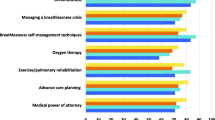Abstract
As part of a project on quality of life in patients with lung cancer, an investigation was carried out to examine how patients reacted to the study. A group of 82 patients attending a chest clinic were interviewed by means of a short questionnaire. They were asked to indicate whether an interview was preferable to filling in a questionnaire and whether a home visit was preferable to a clinic interview, and their feelings about interviews. In addition, we documented our observations during the study period. All patients agreed to participate in the study, of whom, 56 patients (68%) preferred to be interviewed, 8 (10%) preferred to fill in a questionnaire by themselves, and the remaining 18 (22%) expressed no preference. Forty-one patients (50%) preferred to be interviewed at their homes, 13 (16%) in the clinic, and 28 (34%) expressed no preference. Nearly all patients (96%) indicated that they found being interviewed very or quite comfortable. Our observations indicated that patients were pleased to talk about and discuss their perceived cultural and social values or daily life experiences. The findings suggest that, despite the strenuous attempts by clinicians to deliver effective health care, proper communication with patients remains limited. The finding has some implications for community care.
Similar content being viewed by others
References
Bensing J (1991) Doctor-patient communication and the quality of care. Soc Sci Med 32:1301–1310
Berglund G, Sjoden PO (1987) Communication problems with medical staff: a correlate of distress in cancer patients. Scand J Behav Ther 16:111–120
Bernhard J, Gussel H, Hurny C (1995) Quality of life assessment in cancer clinical trials: an intervention by itself? Support Care Cancer 3:66–71
Blanchard CG, Ruckdeschel JC, Fletcher BA, Blanchard EB (1986) The impact of oncologists' behaviours on patient satisfaction with morning rounds. Cancer 58:387–393
Carstairs V, Morris R (1991) Deprivation and health in Scotland. Aberdeen University Press, Aberdeen
Chaitchik S, Kreitler S, Shaked S, Schwartz I, Rosin R (1992) Doctor-patient communication in a cancer ward. J Cancer Educ 7:41–54
Davis H, Fallowfield L (eds) (1991) Counselling and communication in health care. Wiley, Chichester
Engel G (1990) The essence of the biopsychosocial model: from 17th to 20th century science. In: Balner H (ed) A new medical model: a challenge for biomedicine? Swets & Zeitlinger, Amsterdam, pp 86–107
Hermann JF, Carter J (1994) The dimensions of oncology social work: intrapsychic, interpersonal, and environmental interventions. Semin Oncol 21:712–717
Hopkins A, Fitzpatrick R, Foster A (1993) What do we mean by appropriate health care? Report of a working group prepared for the Director of Research and Development of the NHS Management Executive. Quality Health Care 2:117–123
Kaplan SH, Greenfield S, Ware JE (1989) Assessing the effects of physician-patient interactions on the outcomes of chronic disease. Med Care 27: 5110–116
Knobf MT (1990) Symptoms and rehabilitation needs of patients with early stage breast cancer during primary therapy. Cancer 66 [Suppl 6]:1392–1401
Lampic C, Wennberg A, Schill JE, Brodin O, Glimelius B, Sjoden PO (1994) Anxiety and cancer-related worry of cancer patients at routine follow-up visits. Acta Oncol 33:119–125
Lantos J (1993) Informed consent: the whole truth for patients? Cancer 72:2811–2815
Molleman E, Krabbendam PJ, Annyas AA, Koops HS, Sleijfer DT, Vermey A (1984) The significance of the doctor-patient relationship in coping with cancer. Soc Sci Med 18:475–480
Ong LML, Haes JCJM de, Hoos AM, Lammes FB (1995) Doctor-patient communication: a review of the literature. Soc Sci Med 40:903–918
Reddall C (1994) People with cancer have the right to expect the best possible treatment and care. Eur J Cancer Care 3:39–43
Rosenblum D (1994) Listening to people with cancer. Semin Oncol 21:701–704
Roter DL, Hall JA (1992) Doctors talking with patients, patients talking with doctors. Auburn House, Westport, Conn
Roter DL, Hall JA, Katz NR (1988) Patient-physician communication: a descriptive summary of the literature. Patient Educ Counselling 12:99–119
Siminoff LA, Fetting JH (1991) Factors affecting treatment decisions for a life-threatening illness: the case of medical treatment of breast cancer. Soc Sci Med 32:813–818
Spiro H (1992) What is empathy and can it be taught? Ann Intern Med 116:843–846
Street RL (1991) Information giving in medical consultations: the influence of patients' communicative styles and personal characteristics. Soc Sci Med 32:541–548
Sutherland HJ, Lewellyn-Thomas HA, Lockwood GA, Tritchler DL, Till JE (1989) Cancer patients: their desire for information and participation in treatment decision. J R Soc Med 82:260–263
Waitzkin H (1984) Doctor-patient communication: implication of social scientific research. J Am Med Assoc 252:2441–2446
Author information
Authors and Affiliations
Rights and permissions
About this article
Cite this article
Montazeri, A., McEwen, J., Milroy, R. et al. Understanding patients: Let's talk about it. Support Care Cancer 4, 97–101 (1996). https://doi.org/10.1007/BF01845758
Issue Date:
DOI: https://doi.org/10.1007/BF01845758




